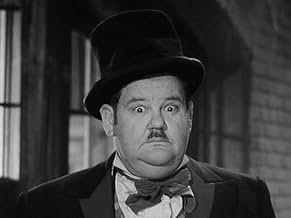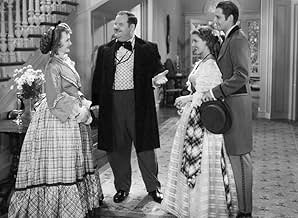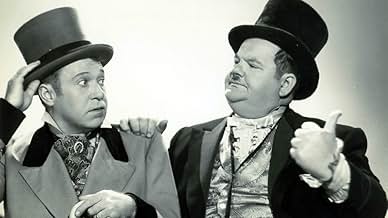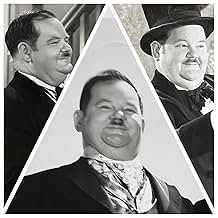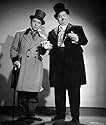Ajouter une intrigue dans votre langueA visiting circus man calls on a Southern country doctor to cure his sick elephant; afterwards, the grateful beast becomes so attached to the doctor that it starts to follow him everywhere.A visiting circus man calls on a Southern country doctor to cure his sick elephant; afterwards, the grateful beast becomes so attached to the doctor that it starts to follow him everywhere.A visiting circus man calls on a Southern country doctor to cure his sick elephant; afterwards, the grateful beast becomes so attached to the doctor that it starts to follow him everywhere.
- Réalisation
- Scénario
- Casting principal
- Zero
- (as Step'n Fetchit)
- Dehlia
- (as Hattie McDaniels)
- Zeke
- (as Phillip Hurlic)
- Church Choir
- (as The Hall Johnson Choir)
Avis à la une
When Hardy is summoned to come help someone who is sick, he races across town only to find that the patient is an elephant (Zenobia) in a traveling carnival. Zenobia's owner (silent comic great, Harry Langdon) helps Hardy figure out how to treat an elephant. Zenobia is so grateful, she falls in love with Hardy and refuses to leave his side. Langdon gets mad and sues Hardy (with the help of mean-spirited Brady). There is a good court room scene and the usual ending.
The cast works well in this mild but pleasant comedy. Many will be disappointed by Langdon's standing in for Stan Laurel, but it's interesting to see Langdon in a talkie. Definitely a B film, but not without its good points.
Hardy is very good in a comic role that allows him a little room to act. Burke and Brady are total pros, and Jean Parker is pretty and pleasing. Ellison is a blank.
Hattie McDaniel plays the cook, J. Farrell McDonald is the judge, Olin Howland is the lawyer, Hobart Cavanaugh plays a patient, Philip Hurlic (as the kid) has a great scene, June Lang plays a rival, and Stepin Fetchit plays himself. William Bakewell can be spotted in a bit part.
Unfortunately, the film lacks the balance of a true Laurel and Hardy film, as Hardy is definitely in the leading role. And, fortunately, Hardy does a pretty good job as the kindly doctor who is befriended by an elephant and he's able to carry this amiable film. Additionally, the movie is very interesting because in a supporting role (one that could have been played by Stan Laurel) was the silent film comedian, Harry Langdon. As there are few of his films still in existence, this is one of the rare chances you'll get to see,...as well as hear him. The story itself is pretty silly but handled so well, you probably will forgive this.
Despite being a story about an Elephant that falls in love with Hardy, you may not like about the film is Stepin Fetchit--the horribly stereotyped Black actor who made a career out of playing some who is dumb and lazy. It's quite a contrast to the role played by Philip Hurlic as 'Zeke'--a smart, precocious and cute Black child. At least there were contrasts, as most of Fetchit's earlier roles provided nothing to balance the negative image.
Ollie is a country doctor in post Civil War Mississippi who lives with wife Billie Burke and daughter Jean Parker in genteel poverty. James Ellison, late of the Hopalong Cassidy series, wants her hand in marriage, but his mother Alice Brady forbids it as Jean's parents are just not her sort.
Nevertheless Ollie and Billie try to help Jean with her romance, but Ollie gets himself entangled with traveling medicine show man Harry Langdon and his performing elephant Zenobia. When the pachyderm becomes ill, Ollie effects a cure and the beast's gratitude makes his life miserable.
Though they were advertised as a team, Langdon and Hardy are not a team really in this film, though their scenes with Zenobia are pretty funny. They're like Abbott and Costello in The Time Of Their Lives, a comedy team in two separate roles in which they only interact occasionally. Actually Burke and Brady, a couple of veteran Broadway performers, have some scenes together and they're pretty good in and of themselves.
Getting Alice Brady and Billie Burke was a casting coup of sorts for Hal Roach. Look at the rest of his cast which he got from the major studios, if he was to have a new comedy team, they would be launched properly.
Of course Stan Laurel came to terms and Langdon and Hardy were no more. But Zenobia is a film filled with gentle humor and some good comic situations.
Hardy's character, then, isn't the pompous, bumbling and flustered one we'd come to love! Langdon, as the owner of a traveling medicine-show and a pachyderm, is okay (especially during his scenes in court - having learned his deposition by heart, every time he's asked to speak he starts from the very top!); this was only his second Talkie that I've watched - the first occurred only recently with HALLELUJAH, I'M A BUM (1933). Jean Parker and James Ellison provide bland romantic interest and the supporting cast also features Oscar winners Alice Brady and Hattie MacDaniel, but their stereotypical characters - snooty matriarch and black cook, respectively - add very little of substance to the proceedings!
In the end, while the elephant's persistent and awkward devotion to doctor Hardy for having cured her (even disrupting a society party and following him into the court-room!) provides some undeniably charming moments, I think I'd still prefer Laurel & Hardy's maligned vehicles of the 1940s over it...
Le saviez-vous
- AnecdotesThis film was originally developed as a Stan Laurel and Oliver Hardy vehicle, but was re-scripted after Stan Laurel, whose contract with Hal Roach had run out, declined to re-sign with the producer. Hardy's contract was still in force, and the team believed that if they waited until it expired, they could re-sign as a team and be in a stronger bargaining position. Ultimately that is what happened.
- Citations
Dr. Tibbett: Oh, Zeke, where are you?
Zeke: Here I is.
Dr. Tibbett: You get the boots shined?
Zeke: Ya sah
Dr. Tibbett: Oh, that's fine. Let's put 'em on.
Zeke: Dr. Tibbett, will I ever turn white?
Dr. Tibbett: Oh, I'm afraid not, Zeke. Why?
Zeke: Well, I'm never gonna be nothin' else 'cept just what I am, only bigger?
Dr. Tibbett: Well, what's wrong with being just what you are?
Zeke: Just that all the other little boys around, they can go to parties, like the party tonight. Cause they're white. And I can't, cause I'm not.
Dr. Tibbett: Listen, Zeke, you don't go to white folks parties. I don't go to colored folks parties. But, that makes no real difference. You understand?
Zeke: No sah.
Dr. Tibbett: Well, Zeke, its like this, you know that medicine kit down in my office?
Zeke: Ya sah.
Dr. Tibbett: Well, there's black pills in it and there's white pills in it. And they're both good kinds of pills. Some people couldn't do without one kind and some couldn't do without the other. You understand?
Zeke: No sah.
Dr. Tibbett: Well, I'll put it another way then. You know next to that medicine kit, what hangs in that big frame over the desk?
[Referring to a copy of the Declaration of Independence]
Zeke: Ya sah.
Dr. Tibbett: Well, that just isn't about countries. That's about people, all kinds. Like black pills, white pills, red, yellow, all colors. What that tells us is, that ALL people can find life, liberty and happiness. You understand now?
Zeke: No sah, not exactly.
Dr. Tibbett: Come here Zeke. Did you ever own a quarter?
Zeke: No sah.
Dr. Tibbett: Well, you go down in that office and learn a little bit of that everyday and when you get it all learned by heart, I'm going to give you this quarter. Do you understand that?
Zeke: Yes sir!
- Versions alternativesColorized version is cut to 65 minutes.
- ConnexionsReferenced in Des souris et des hommes (1939)
- Bandes originalesI Dreamt I Dwelt in Marble Halls
(1843) (uncredited)
From the operetta "The Bohemian Girl"
Music by Michael William Balfe
Lyrics by Alfred Bunn
Sung by Oliver Hardy and Billie Burke with Burke on piano
Meilleurs choix
- How long is Zenobia?Alimenté par Alexa
Détails
- Durée1 heure 13 minutes
- Couleur
- Rapport de forme
- 1.37 : 1
Contribuer à cette page


